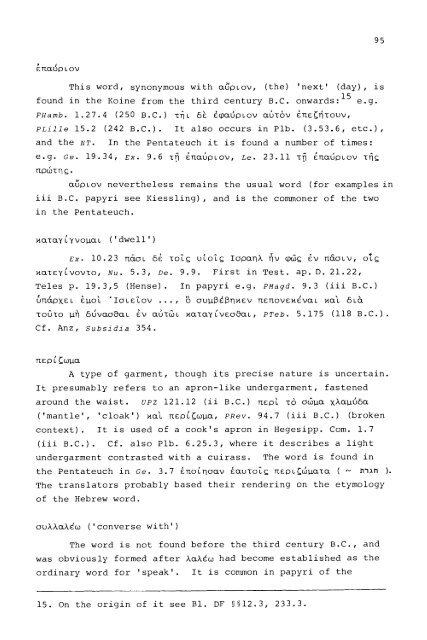A Lexical Study of the Septuagint Version of the Pentateuch
A Lexical Study of the Septuagint Version of the Pentateuch
A Lexical Study of the Septuagint Version of the Pentateuch
You also want an ePaper? Increase the reach of your titles
YUMPU automatically turns print PDFs into web optimized ePapers that Google loves.
επαύριον<br />
This word, synonymous with αΰριον, (<strong>the</strong>) 'next' (day), is<br />
found in <strong>the</strong> Koine from <strong>the</strong> third century B.C. onwards: 15<br />
PHamb. 1.27.4 (250 B.C.) τήι δέ έφαύριον αυτόν έπεζήτουν,<br />
e.g.<br />
PLille 15.2 (242 B.C.). It also occurs in Plb. (3.53.6, etc.),<br />
and <strong>the</strong> NT. In <strong>the</strong> <strong>Pentateuch</strong> it is found a number <strong>of</strong> times:<br />
e.g. Ge. 19.34, EX. 9.6 τή επαύριον, Le. 23.11 τή επαύριον τής<br />
πρώτης.<br />
αΰριον never<strong>the</strong>less remains <strong>the</strong> usual word (for examples in<br />
iii B.C. papyri see Kiessling), and is <strong>the</strong> commoner <strong>of</strong> <strong>the</strong> two<br />
in <strong>the</strong> <strong>Pentateuch</strong>.<br />
καταγίγνομαι ('dwell')<br />
Ex. 10.23 πάσι δέ τοις υίοΐς Ισραήλ ήν φώς έν πάσιν, οΐς<br />
κατεγίνοντο, Nu. 5.3, De. 9.9. First in Test. ap. D. 21.22,<br />
Teles p. 19.3,5 (Hense). In papyri e.g. PMagd. 9.3 (iii B.C.)<br />
υπάρχει έμοί 'Ισιείον ..., δ συμβέβηκεν πεπονεκέναι και δια<br />
τούτο μή δύνασθαι έν αύτώι καταγίνεσθαι, PTeb. 5.175 (118 B.C.).<br />
Cf. Anz, Subsidia 354.<br />
περί ζωμα<br />
A type <strong>of</strong> garment, though its precise nature is uncertain.<br />
It presumably refers to an apron-like undergarment, fastened<br />
around <strong>the</strong> waist. UPZ 121.12 (ii B.C.) περί τό σώμα χλαμύδα<br />
('mantle', 'cloak') καί περίζωμα, PRev. 94.7 (iii B.C.) (broken<br />
context). It is used <strong>of</strong> a cook's apron in Hegesipp. Com. 1.7<br />
(iii B.C.). Cf. also Plb. 6.25.3, where it describes a light<br />
undergarment contrasted with a cuirass. The word is found in<br />
<strong>the</strong> <strong>Pentateuch</strong> in Ge. 3.7 εποίησαν έαυτοίς περιζώματα ( ~ t\~\>n ).<br />
The translators probably based <strong>the</strong>ir rendering on <strong>the</strong> etymology<br />
<strong>of</strong> <strong>the</strong> Hebrew word.<br />
συλλαλέω ('converse with')<br />
The word is not found before <strong>the</strong> third century B.C., and<br />
was obviously formed after λαλέω had become established as <strong>the</strong><br />
ordinary word for 'speak'. It is common in papyri <strong>of</strong> <strong>the</strong><br />
15. On <strong>the</strong> origin <strong>of</strong> it see Bl. DF §§12.3, 233.3.

















